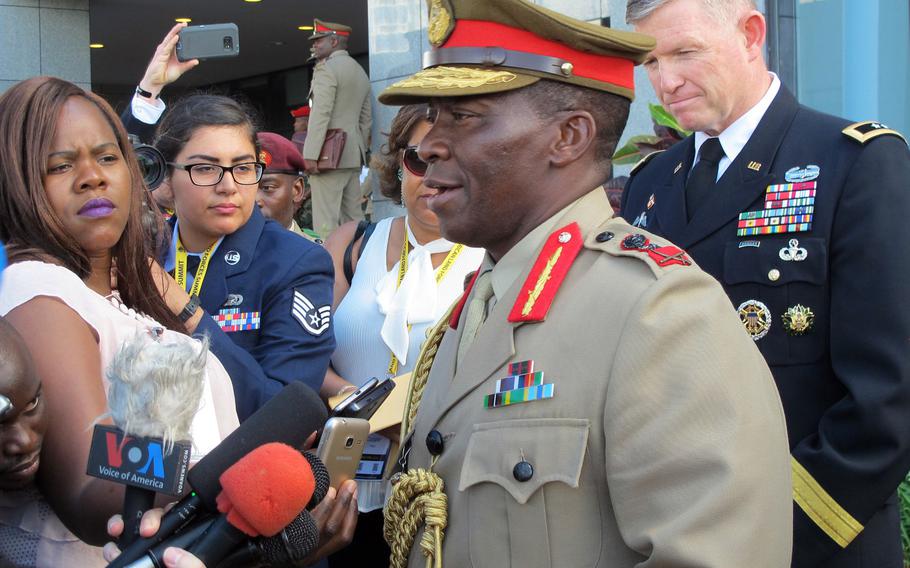
Gen. Griffin Spoon Phiri, commander of the Malawi Defense Forces, and Maj. Gen. Joseph Harrington, commander of U.S. Army Africa, speak to journalists on the first day of the African Land Forces Summit in Lilongwe, Malawi, on Monday May 8, 2017. The summit hosted by U.S. Army Africa seeks to develop cooperation and closer military ties on the African continent. (Nancy Montgomery/Stars and Stripes)
LILONGWE, Malawi — Army chiefs from some 40 countries throughout Africa are meeting in this small southern nation to develop regional strategies to counter security threats facing the continent and forge closer ties during a four-day conference hosted by U.S. Army Africa.
The African Land Forces Summit 17 opened Monday with speeches and encouragement for military men — and one woman, from Swaziland — to speak their minds. “What can make this summit a success is the candid, free exchange of ideas,” said Maj. Gen. Joseph Harrington, commander of U.S. Army Africa.
“The fact that you are all here sitting next to your colleagues and your brothers in arms is success. Anything more is gravy,” he said.
The annual summit is the only event in which the command, which regularly conducts training and medical exercises in Africa, engages simultaneously with military officials from across the continent. It is designed to build trust and friendly relationships between U.S. and African militaries and encourage professionalism within the land forces.
“I think this is the most important event this command executes every year,” said Brig. Gen. Kenneth Moore, USARAF deputy commander. “It’s so beneficial, for access, friendship and relationships.”
The summit came just a few weeks after about 40 African defense chiefs met in Stuttgart, Germany, with officials of U.S. Africa Command.
A chief focus at that conference was Somalia and concerns about the planned withdrawal next year of African Union troops fighting the violent extremist group al-Shabaab. Those troops are to replaced by a nascent Somalia Army. No one from Somalia attended the summit. “Their army doesn’t really exist yet,” Moore said.
Somalia, where the first American service member since 1993 was killed in action last week, “is becoming more significant in our planning and operations,” Moore said.
But Somalia is not the only African country facing security threats. The Lake Chad Basin region, where the violent extremist group Boko Haram has wreaked havoc in a long-time insurgency, was well-represented at the summit. Boko Haram released 82 kidnapped schoolgirls last week in a prisoner swap. Moore said that was indicative of the fact that the group had been marginalized. “So those militaries are grappling with ... what’s the next step,” Moore said. “They’re looking for that political solution.”
At a recent exercise USARAF held in the region, military participants practiced scenarios dealing with those issue. “We focused on surrenders — how do you get them to surrender and reintegrate into society?” Moore said.
Gen. Daniel Allyn, vice-chief of the U.S. Army, said in his speech on Monday that there were some 2,000 U.S. soldiers on the continent. “Africa remains incredibly important to the U.S.,” he said. “Our Army remains committed to combating these threats with you each and every day.”
The event was being co-hosted by Malawi, one of the poorest countries in the world, partly because its army has been a leading provider of peace-keeping forces. “This will bring $1 million to their economy,” said lead USARAF planner Manny Melendez, “and that’s a good thing.”